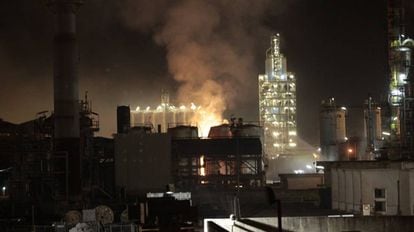
The explosion that hit a chemical plant in Tarragona at 6.38pm on Tuesday was so powerful that it shook the windows of buildings located more than 12 kilometers away. The blast sent flying a piece of metal weighing nearly one ton for more than two kilometers, until it hit a residential building, killing a man who was inside his home. Great clouds of smoke rose up over the surrounding areas and the flames were visible from nearby neighborhoods.
During a lapse of time that felt like an eternity to area residents, no one knew the extent of the accident or the danger it presented. There were no alarms, and no instructions were given. As time passes, there is growing evidence that the communication mechanisms did not work adequately, meaning that accountability must be demanded and protocols reviewed.
No one knew the extent of the accident or the danger it presented
The explosion, which killed three people and left several more seriously injured, took place in a 20-ton reactor of ethylene oxide at a plant surrounded by communities with 300,000 residents. This is one of the hazards most feared by those who live next to the industrial center, which is the largest petrochemical park in southern Europe. Every year, residents go through drills to see if the emergency plans work.
But on this occasion, the company did not issue an alert about the accident and Civil Protection took 20 minutes to activate the emergency plan. With little information on the type of accident or its reach, they decided to preventively tell residents from the neighboring areas and the three closest neighborhoods of Tarragona to stay inside their homes. But this order was communicated via social media. The fact that a report from firefighters later ruled out a toxic cloud cannot mask that the reaction to the accident was not the fast and efficient one outlined in protocols for chemical risks. Fortunately, the explosion did not create a toxic cloud, but if it had, the delay in adopting confinement measures could have had consequences.
This accident does little to build confidence in a community that is terrified about living so close to such a dangerous industry. Both the Catalan regional government and the other agencies involved in emergency management must review the action plans and apply corrective measures, such as unifying the security plans of the companies at the petrochemical park, a longstanding demand of the unions, and improving warning systems. Considering what happened, there must be a faster introduction of systems that directly warn people via their cellphones, something that already occurs in other countries and which is considered under European Union regulations.
English version by Melissa Kitson.
